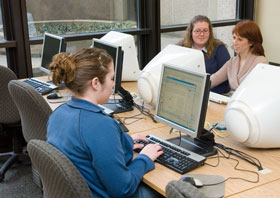  |
| HOME | THIS ISSUE | CALENDAR | GRANTS | BACK ISSUES | < BACK | NEXT > |
New department offers technical support at Health Centerby Pat Keefe - March 27, 2006 |
||||
|
On the Farmington campus, several educational support services have been bundled together to form the Department of Health Informatics. Although the term may be new, the concept is firmly established. It means taking advantage of technology and information resources to aid in education and life-long learning. Renee Drabier, assistant vice president for health informatics, heads the new department. “Health informatics is not rocket science,” she says. “It’s about understanding educational processes and what needs to be done to facilitate the work we do to accomplish the missions of the Health Center. "It’s also about understanding what tools and resources are available, and which can be combined in ways that provide the highest level of service to the faculty, students, and staff who need it.” Support services in the new department are:
Health informatics technology comes into play , for example, when medical Grand Rounds is web-streamed so that more doctors and residents can participate. It’s used when the Celebrate Women program uses interactive video to make a presentation available to those members unable to attend. And it allows medical and dental medicine students to view a graphic illustration as a part of their core curriculum. “The exciting part is that the faculty and the institution have set goals leading to significant cultural change for the organization,” Drabier says. “The commitment is to integrate technology into teaching and learning in new ways.” Short-term department goals address the specific e-learning strategies developed by the faculty of the Health Informatics Advisory Committee and identified as projects important for the educational direction of the medical and dental schools.
In the longer term, the department will work with faculty on the practical goal of making educational resources and technology easier for students and faculty to access and use, and to provide seamless support. Both goals aim at improving learning. “The Health Informatics unit is critical for the educational programs of the School of Medicine,” says Dr. Bruce Koeppen, dean of academic affairs and education, “as we strive to educate our students about the tools and techniques needed for the rapid acquisition of data and information, and the application of that information to improve health outcomes.” One long-standing educational principle of the Health Center’s medical and dental schools is “life-long learning” – teaching students where to go to find the information they’ll need in an information-based society in disciplines where change is constant and innovation is the norm. Health informatics supports that principle. “One size does not fit all,” Drabier says. “The School of Medicine, the School of Dental Medicine, and the Graduate School each have different ways of teaching, and different pedagogies. Their course content varies. We will use our teams’ experience and expertise to provide service and help them apply the appropriate technology.” Dr. R. Lamont MacNeil, associate dean for dental academic and student affairs, says, “Dental faculty are interested in improving their teaching approach, and one way to do that is to appropriately use technology to augment or rethink current modes of classroom or other instruction. "Health Informatics is going to allow us to do that in a more robust manner. “The end everyone desires,” he adds, “is a constantly improving curriculum and educational experience.” |
| ADVANCE HOME UCONN HOME |

